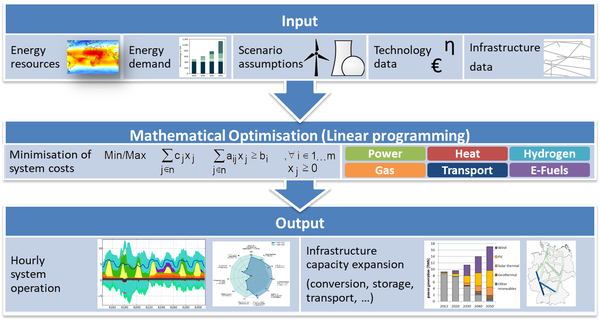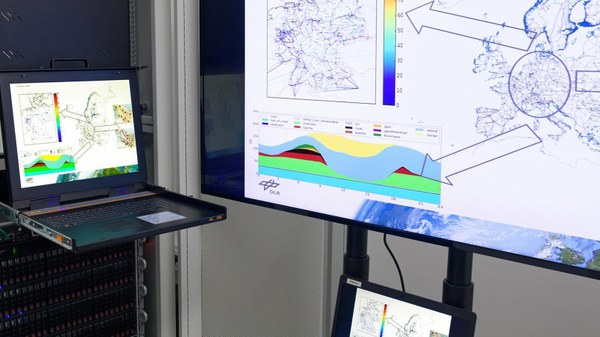Research project ARTESIS
Adaptive and robust transformation pathways for Europe through modelling of sector-integrated energy systems
To reduce greenhouse gas emissions, the share of electricity from renewable sources and fuels produced from it must be continuously increased worldwide in the coming years. Among other things, this will require significant investment in energy infrastructure such as pipelines and terminals that enable the import of climate-neutral fuels such as green hydrogen. Some of these investment decisions have an impact on the entire transformation path of the energy system. Thus, they should be made such that they are still profitable under changing political, economic, societal or technological framework conditions, for example triggered by a disruptive event. Against this background, the ARTESIS project (funded by the Federal Ministry for Economic Affairs and Energy) is dedicated to the further development of optimising, temporally and spatially resolved energy system models to better consider the uncertainties in the planning of future energy infrastructures.
Research project ARTESIS | |
|---|
Duration | January 2024 to December 2026 |
Funded by | German Federal Ministry for Economic Affairs and Energy |
Project participants | - Institute of Networked Energiesysteme
- University of Stuttgart, Center for Interdisciplinary Risk and Innovation Studies (ZIRIUS)
- Karlsruhe Institute of Technology (KIT), Institute for Operations Research (IOR)
|
The impact the Russian attack on Ukraine had on the European energy strategy illustrates just how massive the consequences of external influences can be. The European Commission has drawn up the "REPowerEU" plan with the aim of reducing dependence on Russian energy sources and at the same time accelerating the energy transition. The role of grey and blue hydrogen as a bridging technology in the industrial sector is also being reassessed. This illustrates why adaptivity, robustness and systemic uncertainties must be considered when planning the energy system transformation.
A central goal of the ARTESIS project is to systematically assess the robustness and adaptivity of energy system transformation paths by comprehensively taking long-term systemic uncertainties into account. To this end, methods are being developed to enable long-term cost-optimal decisions for a secure, climate-friendly and cost-effective energy supply while minimising risks along the way. A particular focus of the work is on the uncertainties in the planning of long-term infrastructures and import potential for green hydrogen in Europe.
At the Institute of Networked Energy Systems, the project work focuses on the development, application and open provision of methods that can be used to analyse the impact of long-term uncertainties on optimal transformation paths. To this end, improved stochastic approaches are being integrated into the REMix energy system optimisation framework developed at DLR. They make it possible to capture uncertainties of supply security aspects such as robustness and adaptivity in the integrated optimisation of transformation paths. The aim is to enable different horizons and the dynamic adaptation of the system to disruptive events and to derive suitable time periods for infrastructure decisions.
In the application of REMix, the objectives are on the one hand to integrate consistent socio-economic context scenarios with disruptions and trend changes and on the other hand to determine robust and adaptive transformation paths for a European energy supply system integrated across sectors and countries. Various uncertainties such as the import volumes and costs of green hydrogen are considered. With regard to method development and scenario analysis, the project team is pursuing the open provision of the further developed REMix framework as well as the publication of results, tools and data on the basis of open science principles. In addition, the results are to be made available to users in politics and industry.
Departments, research groups and challenges related to the ARTESIS project:






